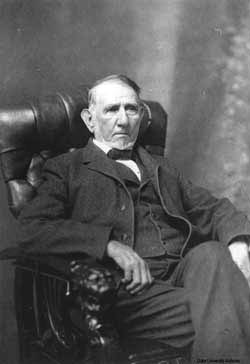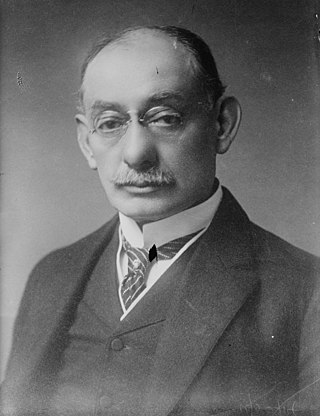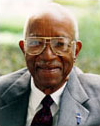Related Research Articles

Washington Duke was an American tobacco industrialist and philanthropist. During the American Civil War he enlisted in the Confederate States Navy. In 1865, Duke founded the "W. Duke, Sons & Co.", a tobacco manufacturer that would be merged with other companies to form conglomerate American Tobacco Company in 1890.

Walter Hines Page was an American journalist, publisher, and diplomat. He was the United States ambassador to Great Britain during World War I. After World War I broke out in 1914 Page was so enthusiastically in favor of Britain during the period of American neutrality that Wilson and other top officials increasingly discounted his views. Page was instrumental in negotiating the sale of American war materials, including munitions, food and supplies, to the British, helping to ensure that it had the resources it needed to continue the fight against Germany.
Thomas Dionysius Clark was an American historian. Clark saved from destruction a large portion of Kentucky's printed history, which later became a core body of documents in the Kentucky Department for Libraries and Archives. Often referred to as the "Dean of Historians" Clark is best known for his 1937 work, A History of Kentucky. Clark was named Historian Laureate of the Commonwealth of Kentucky in 1991.

John Hope Franklin was an American historian of the United States and former president of Phi Beta Kappa, the Organization of American Historians, the American Historical Association, and the Southern Historical Association. Franklin is best known for his work From Slavery to Freedom, first published in 1947, and continually updated. More than three million copies have been sold. In 1995, he was awarded the Presidential Medal of Freedom, the nation's highest civilian honor.
The History of Duke University began when Brown's Schoolhouse, a private subscription school in Randolph County, North Carolina, was founded in 1838. The school was renamed to Union Institute Academy in 1841, Normal College in 1851, and to Trinity College in 1859. Finally moving to Durham in 1892, the school grew rapidly, primarily due to the generosity of Washington Duke and Julian S. Carr, powerful and respected Methodists who had grown wealthy through the tobacco industry. In 1924, Washington Duke's son, James B. Duke, established The Duke Endowment, a $40 million trust fund, some of which was to go to Trinity College. The president thus renamed the school Duke University, as a memorial to Washington Duke and his family.
Douglas L. Wilson is the George A. Lawrence Distinguished Service Professor Emeritus of English at Knox College in Galesburg, Illinois, where he taught from 1961 to 1994. He then was the founding director of the Robert H. Smith International Center for Jefferson Studies at the Thomas Jefferson Foundation (Monticello) in Charlottesville, Virginia. In his retirement, he returned to Knox College to found and co-direct the Lincoln Studies Center with his colleague Rodney O. Davis.
Ray Raphael is an American historian and author of twenty books. He is noted for his work on the American Revolution, the Constitution, and the regional history of Northern California.
Philip D. Morgan is a British historian. He has specialized in Early Modern colonial British America and slavery in the Americas. In 1999, he won both the Bancroft Prize and the Frederick Douglass Prize for his book Slave Counterpoint: Black Culture in the Eighteenth-Century Chesapeake and Lowcountry (1998).
Joseph John Spengler was an American economist, statistician, and historian of economic thought. A recipient of the 1951 John Frederick Lewis Award of the American Philosophical Society and the 1981 Distinguished Fellow Award from the History of Economics Society, he was Professor Emeritus of Economics at Duke University at the time of his death.

Oliver Morton Dickerson was an American historian, author, and educator. Like his fellow historians Charles McLean Andrews and Lawrence Henry Gipson, Dickerson was a proponent of the "Imperial school" of historians who believed that the American colonies could not be studied or understood except as part of the British Empire. Among his publications were works on the British Board of Trade, the Navigation Acts, and Boston under military rule.
The following is a timeline of the history of the city of Durham, North Carolina, USA.

Alfred Fabian "Al" Young (1925–2012) was an American historian. Young is regarded as a pioneer in the writing of the social history of the American Revolution and was a founding editor of the academic journal Labor: Studies in Working-Class History of the Americas.

John Campbell Dancy was an American politician, journalist, and educator in North Carolina and Washington, D.C. For many years he was the editor of African Methodist Episcopal (AME) Zion church newspapers Star of Zion and then Zion Quarterly. In 1897 he was appointed collector of customs at Wilmington, North Carolina, but was chased out of town in the Wilmington insurrection of 1898, in part for his activity in the National Afro-American Council which he helped found that year and of which he was an officer. He then moved to Washington, D.C., where he served as Recorder of Deeds from 1901 to 1910. His political appointments came in part as a result of the influence of his ally, Booker T. Washington.
Henry Arlin Turner was an American biographer and professor of English, specializing in American literature of the 19th century.
Carl Frederick Wittke, was an American historian and academic administrator. He was a specialist on ethnic history in America, especially regarding the German Americans. He was born in Columbus, Ohio in 1892; his father was a German immigrant who owned a factory. In 1913 he graduated Phi Beta Kappa from Ohio State University, and gained a PhD in history under Professor Charles Howard McIlwain at Harvard in 1921. He taught history at Ohio State University (1921–37), and for a few years was chair of the history department and later, dean of the graduate school. He was the dean at Oberlin College (1937–1948). He then became dean of the graduate school at Western Reserve University, until his retirement in 1963.
Hilary L. Rubinstein is an Australian historian and author. She researches and writes on British naval history and modern Jewish history.
Fletcher Melvin Green was a historian and writer at the University of North Carolina at Chapel Hill, where he was a faculty member from 1936 until 1960 and served as a department chair. The University has a collection of his papers. He also taught at Harvard and Oxford.
Robert Franklin Durden was an American historian and author who worked at Duke University. He wrote books about Duke's history, journalist James S. Pike, and historian Carter G. Woodson.
The South Atlantic Quarterly is an American little magazine founded by John Spencer Bassett, a history professor at Trinity College, in 1901. The magazine published articles about on southern history and, following the example of the Sewanee Review, also tackled topics dealing with the issue of race in the South.
Richard Beale Davis was an American academic who specialised in the history of the Southern United States, with a focus on its literature and intellectual history. His works included the 1978 book Intellectual Life in the Colonial South, which was awarded the National Book Award for history, as well as several other accolades. He taught at the University of Virginia, University of South Carolina, and University of Tennessee, among other places.
References
Cross-reference
- ↑ Durden 1981, p. 214.
- 1 2 3 4 5 6 7 8 9 Durden 1988.
- ↑ Durden 1993, p. 137.
- ↑ Fogerty 1954, p. 733.
- 1 2 3 4 5 Durden 1981, p. 215.
Sources
- Durden, Robert Franklin (1981). "Hamilton, William Baskerville". Lives of Mississippi Authors, 1817–1967. University Press of Mississippi. pp. 214–215. ISBN 9781617034183.
- Durden, Robert F. (1988). "Hamilton, William Baskerville". In Powell, William S. (ed.). Dictionary of North Carolina Biography. University of North Carolina Press.
- Durden, Robert Franklin (1993). The Launching of Duke University, 1924–1949. Duke University Press. ISBN 9780822313021.
- Fogerty, Robert P. (1954). "Rev. of Anglo-American Law on the Frontier: Thomas Rodney and His Territorial Cases. By William Baskerville Hamilton". Journal of American History . 40 (4): 733–734. doi:10.2307/1895875. JSTOR 1895875.